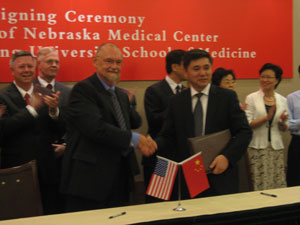 |
UNMC’s Tom Rosenquist, Ph.D., shakes hands with Zheng-Guang Zhu, M.D., Ph.D., president of Shanghai Jiao Tong University School of Medicine, as Nebraska Gov. Dave Heineman, left, and UNMC’s Ward Chambers, M.D., second from left, look on. |
 |
The city of Shanghai. Photo provided by Judy Huey. |
It’s a long way to China, but efforts in September have brought China and UNMC closer.
A team of seven UNMC faculty traveled in September to three cities in China as part of the UNMC Asia Pacific Rim Development Program (APRDP). The program is boosting UNMC’s outreach abilities with China and the Asian-Pacific regions — areas now undergoing massive economic growth.
The team accomplished a variety of activities over a nine-day trip in Shanghai, Beijing and Xi’An, including launching new partnership discussions and formal affiliations, and renewing other partnerships. UNMC faculty were among about 65 Nebraskans making the journey. In Shanghai, UNMC officials, Nebraska Gov. Dave Heineman and his delegation were brought together for several important events.
Tom Rosenquist, Ph.D., vice chancellor for research at UNMC, said the value of this and other agreements and interactions raises the medical center’s stature.
“Our new academic partnerships in China make UNMC a global player and that brings with it several advantages,” Dr. Rosenquist said. “The great UNMC research, clinical and educational programs immediately become more well-known around the world. We are determined to be ‘world-class,’ and this really puts us out there in the world at a high level.
“The opportunities increase logarithmically for our faculty and students to interact with high quality institutions abroad,” he said. “We have found that our partners have things to offer that we don’t have, and they recognize the same in us. That is the nature of an excellent partnership.”
Dr. Rosenquist, Jialin Zheng, M.D., director of the APRDP, and others credit UNMC Chancellor Harold M. Maurer, M.D., for his leadership and support of advancing the program.
|
“We have paid special attention to our Chinese partners in Shanghai and Beijing, and now we are well-known there,” said Tom Rosenquist, Ph.D., vice chancellor for research at UNMC. “We no longer get questions about where Nebraska is, or what kind of medical university we have because students, faculty, the administration and government party representatives have been here and reported back very positively about UNMC.” “The questions we get now are, ‘How can I go there?’ and ‘How can you help me get there as an exchange student or faculty member?'” Dr. Rosenquist said. In Xi’An, Dr. Rosenquist said virtually nothing was known about UNMC. “So questions were about what kind of research and clinical care we specialize in, where do we rank in certain areas nationally, what are we best at,” he said. “They do ask more acute questions about what we can offer that’s different or of better quality than Baylor, Duke or Harvard.” Dr. Rosenquist and Jialin Zheng, M.D., director of the UNMC Asia Pacific Rim Development Program (APRDP) said friendship is an important outcome of partnerships, as well as promoting cultural diversity and understanding. Of the many post-doctoral researchers on the UNMC campus, 77 percent are from countries other than the United States, and many are from China, Dr. Rosenquist said. “People who do research together become connected in unique ways, almost like family members who share ups and downs, grief and sorrows, shared goals and shared challenges,” he said. “They’re always part of your family after that. Therefore our sharing our labs with so many friends from abroad will result in increased scientific and therefore other kinds of cooperation between the countries. It’s an inevitable consequence.” |
In the summer of 2004, then-Nebraska Gov. Mike Johanns led a trade mission delegation to China. Under the leadership of Dr. Rosenquist and Don Leuenberger, vice chancellor for business and finance, UNMC established collaborations with two prestigious Chinese institutions, Shanghai Jiao Tong University School of Medicine (SJTUSM) — previously named Shanghai Second Medical University — and the Graduate University of Chinese Academy of Science (GUCAS).
Other UNMC leaders have made the trip to China to make this partnership grow, including College of Medicine Dean John Gollan, M.D., Ph.D., College of Nursing Dean Virginia Tilden, D.N.Sc., Vice Chancellor for Academic Affairs Rubens Pamies, M.D., and Leuenberger. Although UNMC has had a variety of academic agreements with different Chinese universities for more than 25 years, Dr Rosenquist believes that this is the first integrated and comprehensive, medical center-wide partnership.
In Shanghai, UNMC and Shanghai Jiao Tong University School of Medicine confirmed and refined a formal joint research program that began in 2004, when UNMC and Shanghai officials were joined by Johanns, who enthusiastically endorsed the partnership.
The signing ceremony this year included Dr. Rosenquist as well as Heineman, Zheng Han, mayor of Shanghai, Xiaoming Shen, M.D., Ph.D., the minister of education of Shanghai City, Jie Zhang, Ph.D., president of Shanghai Jiao Tong University and Zheng-Guang Zhu, M.D., Ph.D., president of SJTUSM.
UNMC and Chinese officials also launched a unique international M.D./Ph.D. program. In addition, the agreement expanded existing medical student, nursing student and faculty exchanges, and renewed and expanded the UNMC-Shanghai Jiao Tong University School of Medicine Partnership Agreement for research. Shanghai Jiao Tong University is among the top five graduate colleges in China, Dr. Rosenquist said.
“The establishment of an M.D./Ph.D. program with their medical school is one of the first agreements between an American and Chinese institution,” Dr. Rosenquist said. “We think it has unique characteristics that will make it very attractive.”
Other potential joint degree programs are under consideration by the UNMC College of Nursing and Graduate Studies. Student and faculty exchanges among all of the UNMC colleges are currently under negotiation.
“The uniquely favorable treatment of UNMC students, faculty and programs by the Shanghai Jiao Tong University Medical School is a powerful endorsement of the success of the program and is an important sign of our strong, growing reputation in China,” Dr. Rosenquist said. In addition, he said, “We were very pleased there was high level recognition of the role of universities in economic development, and the partnership between UNMC and Jiao Tong University was cited by both the governor of Nebraska and the mayor of Shanghai as a key to further development.”
The recent trip included Dr. Zheng, who also is an associate professor in the UNMC Departments of Pharmacology/Experimental Neuroscience and Pathology/Microbiology; Ward Chambers, M.D., UNMC coordinator of programs, international health and medical education, Kai Fu, M.D., assistant professor and staff pathologist, Paul Paulman, M.D., professor of family medicine, Audrey Paulman, M.D., clinical associate professor of family medicine, Yong Zhao, M.D., Ph.D., assistant professor, UNMC Department of Pharmacology and Experimental Neuroscience.
Dr. Zheng is leading the UNMC effort in China.
“He’s a brilliant leader in this interaction with China,” Dr. Rosenquist said. “He selects the right institutions, the right people in those institutions, and promotes our interactions with the right government and university officials. In addition, he finds the right people at UNMC to interact with our Chinese colleagues to promote the exchange. He’s the heart and soul of the business.”
Dr. Zheng is from Dongtai city, a “small” Chinese city of one million people, he said. He received his doctor of medicine in China, then in 1993 came to work for UNMC’s Terry Hexum, Ph.D., and Myron Toews, Ph.D., as a post-doctoral researcher. In 1996, he began working with Howard Gendelman, M.D., chairman of the UNMC Department of Pharmacology and Experimental Neuroscience and director of the Center for Neurovirology and Neurodegenerative Disorders.
Dr. Zheng, now a U.S. citizen, hadn’t been back to China until 2002 when he was invited to deliver a lecture in Shanghai.
“I saw significant changes and greater opportunities in China,” Dr. Zheng said. “A lot happened in 10 years.”
He sees a unique niche for UNMC partnerships in China.
“The Asia-Pacific region is a very important place to be. It’s important for Nebraska to collaborate if we want to be world-class,” Dr. Zheng said. “We have had a long history of partnerships in Europe. China is a growing economic power with developing scientific power.”
He said UNMC can use its strengths in various areas such as cancer, transplantation, neuroscience, cardiovascular diseases, immunology and rural health care, to partner in areas that need to improve and conversely, UNMC can choose partners to improve in various areas.
Drs. Rosenquist and Zheng said another major outcome of the trip in Beijing was establishing the China-U.S. Joint Research Center for Medical Sciences and Genetics.
UNMC faculty worked with Le Kang, director-general of the Bureau of Life Sciences and Biotechnology of the Chinese Academy of Sciences. The academy is the premier science organization in China, similar to a combination of the U.S. Academy of Sciences and the National Institutes of Health.
“They put $300,000 a year on table and we put $100,000 to get the center started. It will be operated as, and projects done jointly by, UNMC and the Chinese Academy of Sciences and will be expanded over time to include other high quality universities,” Dr. Rosenquist said.
Dr. Rosenquist presented a courtesy UNMC professorship to Le Kang on behalf of Dr. Gollan during a large, elegant ceremony in an auditorium filled with students and faculty.
“It was well received,” Dr. Rosenquist said. “He was quite touched by the gesture.”
Another outcome of the partnerships is UNMC’s inclusion in a growing select list of 14 American universities Chinese students can attend. The Chinese Scholarship Council will provide funding to send 5,000 students each year for the five next years to universities on the list, which includes Emory University, Harvard University, University of Chicago and Washington University in St. Louis and Yale University.
One of the reasons for UNMC making the list is its history of cooperation with China.
“They see UNMC’s strengths. Our people have left a great impression,” Dr. Zheng said. “One of the impressions is when we say we will do something, we do it. This quality is valued very highly by our Chinese partners. And the cost of living is lower here along with some of the best programs in U.S. medical institutions.”
Dr. Zheng said the UNMC team forged a new partnership in Xi’An city with Xi’An Jiao Tong University Health Science Center, which is in the “Midwest of China.” An academic agreement was signed to begin to promote exchanges between faculty and students.
Discussions in Xi’An also focused on how UNMC might help provide a model for developing rural and family medicine programs in China.
“The development of joint programs with Chinese medical schools and hospitals will provide extraordinary career experience for our medical students, residents, and research and clinical faculty,” Dr. Gollan said. “As other U.S. medical schools also build relations with their Chinese counterparts, our window of opportunity in China will diminish. Currently, we are well positioned to move quickly and build relations with some of the premier Chinese universities — the benefits for the College of Medicine will be substantial.”
What others are saying …
“The growing partnerships reflect UNMC’s high degree of appreciation for China’s scientific expertise, along with their energy and commitment to addressing national and global health issues. Specific to nursing, we have much to learn from each other in approaches to patient and family care. I am very committed to our excellent student and faculty exchanges and anticipate these will grow in the future.”
Virginia Tilden, D.N.Sc., dean of the UNMC College of Nursing
“During this trip, we explored logistical issues such as room and board, instruction, language support, and transportation for our medical students planning to participate in an elective clinical rotations in Shanghai. We also established initial contact with the educators and administrators at Xi’An regarding possible collaborations between UNMC and Jiao Tong University in exploring the possibility of upgrading training for primary care providers in rural China.”
Paul Paulman, M.D., College of Medicine Assistant Dean for Clinical Skills and Quality